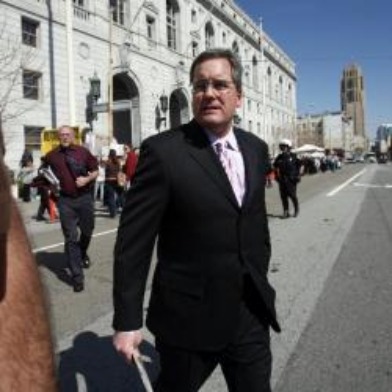
San Francisco unnecessarily paid millions of dollars in sewer replacement claims in an alleged scheme by the city attorney’s office that a staffer was fired for investigating, according to a claim by the terminated attorney.
In the claim filed Tuesday by attorney Stephen Murphy, former Chief Trial Deputy Joanne Hoeper said that she found several thousand suspicious claims for damage to private sewer lines by city-owned tree roots that the city paid between 2002 and 2011. She estimated the claims cost the city more than $10 million.
But when she pointed out the findings of her investigation to City Attorney Dennis Herrera, Hoeper said she was transferred to the district attorney’s office and fired at the beginning of Herrera’s next term.
She claims her termination was retaliation for her investigation and seeks lost wages and other unspecified damages. Such a claim is usually the precursor to a lawsuit.
City attorney’s office spokesman Matt Dorsey said in a statement that Hoeper’s claims are “the baseless allegations of wrongdoing from a disgruntled former employee.”
Dorsey said the claims were thoroughly reviewed by outside counsel and that the city attorney’s office would be “vindicated” at the conclusion of the case.
“The City Attorney takes his duty to protect the taxpayers and their funds very seriously, and Ms. Hoeper’s claim for civil damages will be no exception,” Dorsey said.
Hoeper’s claim said that her investigation began late in 2011, when an FBI agent tipped her off to the possible scheme in the city attorney’s office.
While she received reassurance from the city attorney’s claims bureau that the city routinely denied problematic claims, she kept digging because of the seriousness of the allegations and assigned two investigators to the case.
Hoeper discovered that no other California city paid to replace sewers damaged by city tree roots and consulted experts who said that tree roots do not cause sewer breaks but infiltrate already damaged lines, according to the claim.
The city also paid the full cost of replacing—rather than repairing—the damaged sewer lines, replacing some lines that were more than 100 years old, according to the claim.
The paid claims had false statements, inflated bills, and suspiciously similar signatures, Hoeper found, and the plumbing companies had solicited many of the claims, even when the property owner was not having sewer problems.
The assistant chief of the claims bureau, Michael Haase, and his supervisor, Matthew Rothschild, approved the claims, according to Hoeper’s allegations.
One plumbing company’s sole source of income was apparently from city sewer claims while other companies took the majority of their income from such claims for years, Hoeper found.
Haase was in communication with the plumbing companies benefiting from the claims and would often know about the claims before they were even filed, according to Hoeper, and he would approve the claims despite “obvious red flags.”
Since Rothschild was the claim division’s chief and responsible for the final approval of all claims against the city, Hoeper questioned his conduct as well.
According to Hoeper’s account, Herrera met with Rothschild in May 2012 and informed him about Hoeper’s investigation. Immediately after the meeting, he burst into Hoeper’s office trembling with anger and shouted at her, “You’ll be sorry” and “I won’t stand for this.”
At one point, he said he would stage a hunger strike if she kept at her investigation, according to Hoeper.
The payments for the damage to sewer lines by city-owned trees stopped in June 2012. The next month, Herrera assigned another attorney to take over and wrap up the investigation, according to Hoeper, who wrote up a 27-page draft report of her findings and submitted it to Herrera.
Hoeper kept looking into the case and after examining 65 claims from a particular plumbing company between mid-2010 and mid-2011, found that each claim was inflated by about $3,000. In her claim, Hoeper speculated that Haase had been receiving at least a portion of the $3,000.
The morning after Hoeper revealed these findings to the new lead investigator, Herrera called Hoeper into his office and told her that she would be transferred to the district attorney’s office.
Hoeper alleges that Herrera told her that she would maintain the same salary and a title in the city attorney’s office until the end of Herrera’s term as city attorney in January 2014, when she would be terminated.
Hoeper was fired on Jan. 7, 2014, the first day of Herrera’s third term as city attorney, according to Hoeper’s claim against the city.
Hoeper’s claim states that Herrera stopped any investigation into the matter after her termination.
Scott Morris, Bay City News









